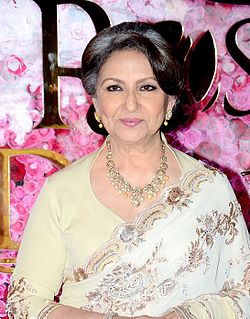| National Film Award for Best Actress in a Supporting Role | |
|---|---|
| National award for contributions to Indian cinema | |
The 2023 recipients: Urvashi and Janki Bodiwala | |
| Awarded for | Best performance by an actress in a supporting role |
| Sponsored by | National Film Development Corporation of India |
| Formerly called | National Film Award for Best Supporting Actress (1984–2021) |
| Reward(s) |
|
| First award | 1984 |
| Final award | 2022 |
| Most recent winner | |
| Highlights | |
| Total awarded | 41 |
| First winner | Rohini Hattangadi |
| Website | https://dff.gov.in/Archive.aspx?ID=6 |
The National Film Award for Best Actress in a Supporting Role is an honour presented annually at India's National Film Awards ceremony by the National Film Development Corporation of India (NFDC), an organisation set up by the Indian Ministry of Information and Broadcasting. [1] Since 1984, the award is given by a national panel appointed annually by the NFDC to an actress for the best performance in a supporting role within Indian cinema. [1] [2] It is presented by the President of India at a ceremony held in New Delhi. [3] Since the 70th National Film Awards, the name was changed to "Best Actress in a Supporting Role". [4]
Contents
The winner is given a "Rajat Kamal" (Silver Lotus) certificate and a cash prize of ₹2,00,000. [a] Including ties and repeat winners, the NFDC has presented a total of 41 Best Supporting Actress awards to 35 different actresses. Although Indian cinema produces films in more than 20 languages, [1] the performances of films that have won awards are of 11 languages: Hindi (20 awards), Malayalam (8 awards), Bengali (4 awards), Tamil (4 awards), English (2 awards), Gujarati (1 award), Haryanvi (1 award), Marathi (1 award), Meitei (1 award), Odia (1 award) and Urdu (1 award).
The first recipient was Rohini Hattangadi, who was honoured at the 32nd National Film Awards for her performance in the Hindi film Party (1984). [7] As of 2023 [update] edition, Surekha Sikri has been honoured thrice for her Hindi films – Tamas (1987), Mammo (1994) and Badhaai Ho (2018). [8] K. P. A. C. Lalitha won the award two times for her work in the Malayalam films Amaram (1990) and Shantham (2000) [9] along with Pallavi Joshi for her work in Hindi films The Tashkent Files (2019) and The Kashmir Files (2021) and Urvashi for her works in Malayalam films Achuvinte Amma (2005) and Ullozhukku (2023). Egyptian actress Aida El-Kashef, who was honoured at the 61st National Film Awards for her performance in the English-Hindi film Ship of Theseus (2013) is the only non-Indian actress to win the award. [10] Urvashi and Kalpana are the only siblings to receive the honour. Ties between two actresses have occurred in the years 1999, 2012, 2013 and 2023. Sharmila Tagore, Konkona Sen Sharma and Kangana Ranaut are the three actresses to receive honours in both acting categories: Best Actress and Best Supporting Actress. The most recent recipients of the award are Urvashi and Janki Bodiwala, who were honoured at the 71st National Film Awards ceremony for their performance in the 2023 films Ullozhukku and Vash respectively.






